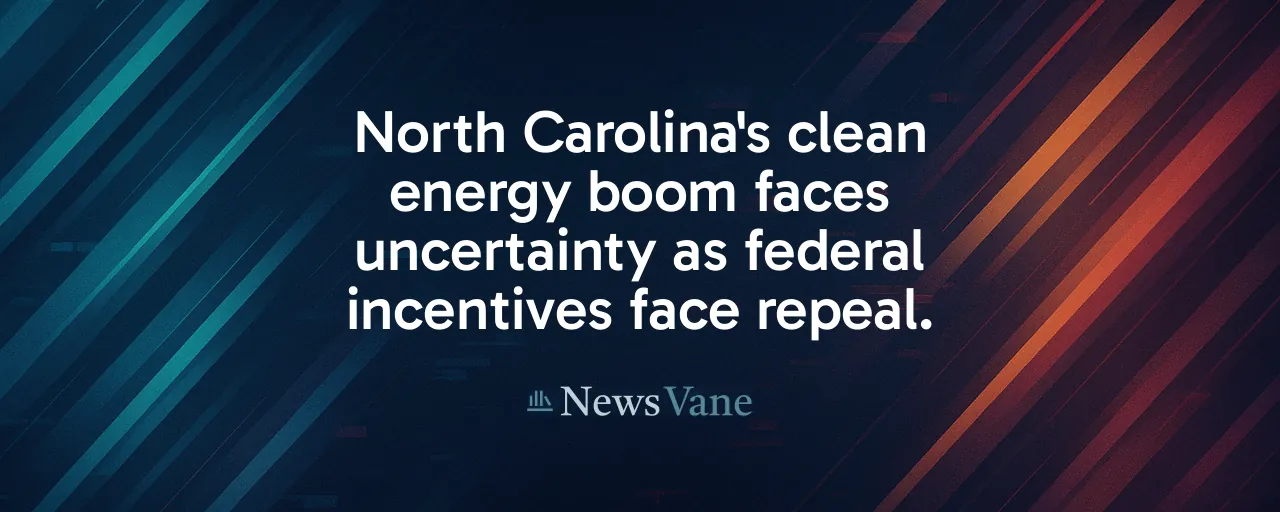A State Riding the Clean Energy Wave
North Carolina buzzes with economic energy. New factories churn out solar panels, batteries, and electric vehicle chargers, creating thousands of jobs and drawing billions in investment. Federal tax credits from the Inflation Reduction Act of 2022 have powered this growth, making the state a hub for clean energy manufacturing. Now, a congressional proposal to eliminate these incentives has ignited a fierce debate, casting a shadow over this progress.
Governor Josh Stein recently urged federal lawmakers to protect the tax credits, emphasizing their role in bringing businesses and opportunities to the state. His plea to Senate leaders underscored the risks of repeal: stalled projects, lost jobs, and higher utility bills for families. This issue reaches far beyond North Carolina, touching on national concerns like energy security, affordability, and economic vitality.
How Tax Credits Drive Prosperity
Since the Inflation Reduction Act took effect, North Carolina has attracted over $24 billion in clean energy investments. These projects include batteries, solar components, and grid technologies, directly employing tens of thousands and supporting more than 100,000 jobs in the state's clean energy sector. Across the U.S., the credits have sparked $360 billion in projects and 312,000 jobs, with most new factories opening in Republican-led districts.
Incentives like the advanced manufacturing production credit cover up to 30 percent of costs for clean energy projects. They've doubled manufacturing construction value and lured companies to states like North Carolina, where jobs pay $42,000 above the national average. A single county might gain $500 million in investment, sparking economic growth that lifts entire communities.
The Cost of Turning Back
A House bill, known as H.R. 1, seeks to end these credits within 60 days of passage, stopping new projects and phasing out production incentives by 2028. Studies project this could raise household electricity costs by 5-7 percent by 2030, adding $75-$150 to annual family bills. In North Carolina, households could face a 13 percent hike, and businesses a 20 percent jump, costing families an extra $200 yearly.
The economic fallout could be steep. Nationwide, over $500 billion in planned projects and 600,000-800,000 jobs could vanish by 2035. In North Carolina, billions in investments and thousands of jobs are at risk. Repeal could also slow efforts to bring critical supply chains, like batteries and solar components, back to the U.S., a move many tie to national security.
Perspectives in the Debate
Those defending the credits, including Democratic lawmakers and clean energy firms, argue they drive economic and environmental progress. Data shows the credits could cut emissions 40 percent below 2005 levels by 2030 and save households $170-$220 yearly through lower electricity costs. Rural cooperatives and non-taxable entities also gain from direct payments, broadening the economic benefits.
Opponents, including some Republican lawmakers and free-market groups, view the credits as expensive subsidies that skew markets. They cite a $1 trillion cost over a decade and argue the funds could better support 2017 tax cut extensions or deficit reduction. Concerns about grid reliability, drawn from past outages in renewable-heavy states, and reliance on foreign supply chains also fuel their case.
Weighing the Trade-Offs
This debate reveals clashing visions for America's energy path. Defenders of the credits see them as a spark for innovation and job growth, positioning the U.S. to dominate a $23 trillion global clean-tech market. Critics prioritize fiscal discipline and energy reliability, advocating tax relief or deregulation to boost growth. Both sides value domestic manufacturing but differ on the best approach.
North Carolina's story highlights the stakes. Its clean energy boom has delivered jobs, investment, and economic strength. Yet, the threat of higher utility costs and job losses if credits vanish shows the complex choices policymakers face. The decision will shape the state's economy, national energy policy, and household budgets.
What Lies Ahead
As Congress debates H.R. 1, the implications for North Carolina and the nation are stark. Keeping the tax credits could maintain the state's clean energy momentum, fostering jobs and stabilizing costs. Eliminating them risks halting investments and raising prices, affecting families and businesses alike.
The outcome depends on broader questions: How can the U.S. foster economic growth while managing fiscal constraints? Can clean energy deliver affordability and security? For now, North Carolina's clean energy workers and residents wait, their futures tied to decisions in Washington.
The path forward requires thoughtful deliberation. Policymakers weigh data, diverse perspectives, and the public's needs. North Carolina's clean energy journey continues, but its trajectory depends on the choices made today.
